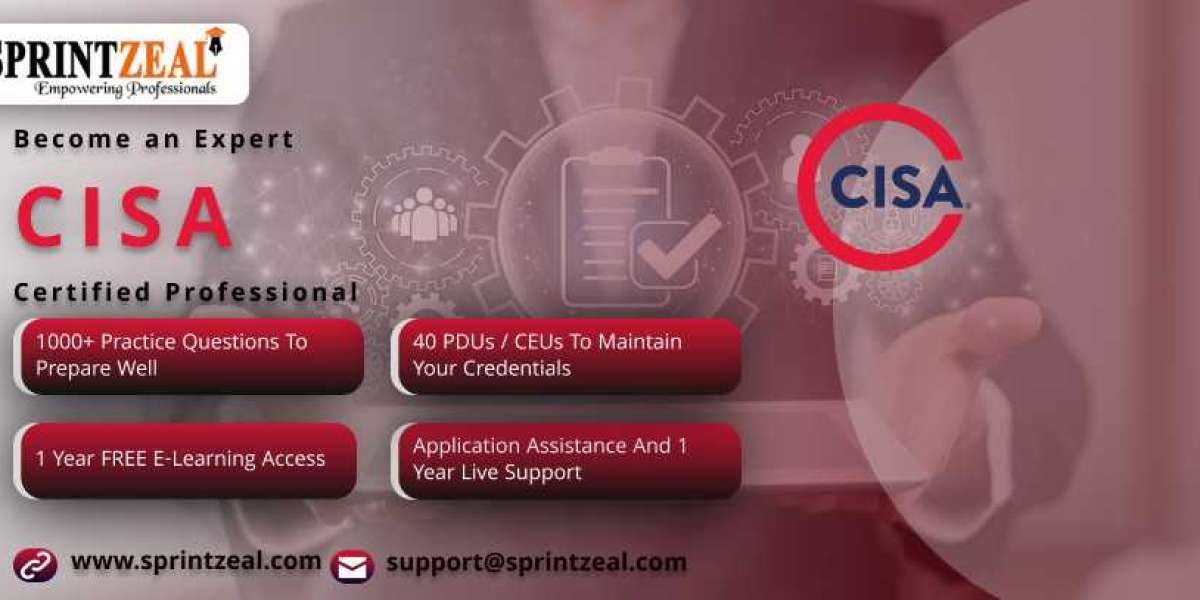In the dynamic landscape of information technology, ensuring the security and integrity of data has become paramount. With the ever-increasing reliance on digital systems, the demand for skilled professionals who can safeguard these systems against threats has surged. Among the certifications that validate expertise in this field, the Certified Information Systems Auditor (CISA) certification stands out as a benchmark for professionals aspiring to excel in IT audit, control, and assurance.
Understanding CISA Certification:
CISA certification is globally recognized and sought after by organizations for its rigorous standards and comprehensive coverage of information systems auditing, control, and assurance. Offered by the Information Systems Audit and Control Association (ISACA), CISA certification demonstrates an individual's proficiency in assessing vulnerabilities, implementing controls, and ensuring compliance within an organization's information systems.
Why Pursue CISA Certification?
1. Industry Demand:
In today's digital era, data breaches and cyber threats have become commonplace. Organizations across all sectors are actively seeking professionals equipped with the knowledge and skills to fortify their information systems against such risks. CISA certification validates expertise in this critical domain, making certified professionals highly sought after by employers worldwide.
2. Career Advancement:
Holding a CISA certification can significantly enhance career prospects in the field of information security and audit. Certified professionals often enjoy higher salaries, increased job opportunities, and greater job security compared to their non-certified counterparts. Moreover, CISA certification opens doors to diverse roles such as IT auditor, compliance analyst, security consultant, and risk manager, among others.
3. Professional Development:
The CISA certification process involves comprehensive study material and rigorous examination, ensuring that certified professionals possess a deep understanding of information systems auditing principles and practices. Pursuing CISA certification not only validates existing skills but also provides an opportunity for continuous learning and professional growth in the rapidly evolving field of information technology.
Key Requirements for CISA Certification:
1. Eligibility Criteria:
To be eligible for CISA certification, candidates must meet certain criteria set by ISACA. Typically, this includes a minimum of five years of professional experience in information systems auditing, control, or security. However, waivers or substitutions may be granted for a portion of this requirement based on education and relevant work experience.
2. Examination:
The CISA certification exam consists of multiple-choice questions that assess candidates' knowledge across four domains:
- Domain 1: The Process of Auditing Information Systems
- Domain 2: Governance and Management of IT
- Domain 3: Information Systems Acquisition, Development, and Implementation
- Domain 4: Information Systems Operations, Maintenance, and Service Management The exam is designed to evaluate candidates' understanding of key concepts, principles, and practices related to information systems auditing and control.
3. Continuing Professional Education (CPE):
Maintaining CISA certification requires ongoing professional development through the accumulation of Continuing Professional Education (CPE) credits. CISA-certified professionals must earn a minimum of 20 CPE credits annually and a total of 120 CPE credits within a three-year certification cycle to remain active.
Preparation Strategies for CISA Certification:
1. Study Resources:
ISACA offers official study materials, including review manuals, practice questions, and online resources, to help candidates prepare for the CISA exam. Additionally, there are numerous third-party books, courses, and practice exams available to supplement study efforts and reinforce key concepts.
2. Hands-on Experience:
Practical experience in information systems auditing and control is invaluable for CISA certification aspirants. Candidates should seek opportunities to apply theoretical knowledge in real-world scenarios, either through work assignments, internships, or practical exercises.
3. Join Study Groups:
Collaborating with peers who are also preparing for the CISA exam can provide valuable insights and support. Joining study groups or online forums dedicated to CISA certification allows candidates to share resources, discuss challenging topics, and stay motivated throughout the preparation process.
4. Practice, Practice, Practice:
Consistent practice is key to success in the CISA exam. Candidates should allocate sufficient time to solve practice questions and simulated exams to familiarize themselves with the exam format, improve time management skills, and identify areas for further study.
Conclusion:
In an era defined by digital transformation and cybersecurity threats, the importance of information systems auditing and control cannot be overstated. CISA certification serves as a testament to an individual's expertise in this critical domain, opening doors to rewarding career opportunities and professional advancement.
By meeting the rigorous requirements, demonstrating proficiency in key domains, and staying abreast of industry developments through continuous professional education, CISA-certified professionals play a vital role in safeguarding organizations against emerging threats and ensuring the integrity and security of their information systems.
For aspiring professionals looking to carve a niche in the field of information security and audit, pursuing CISA certification is a strategic investment that can propel their careers to new heights and make them invaluable assets to organizations seeking to mitigate risks and enhance their cybersecurity posture in an increasingly complex digital landscape.








